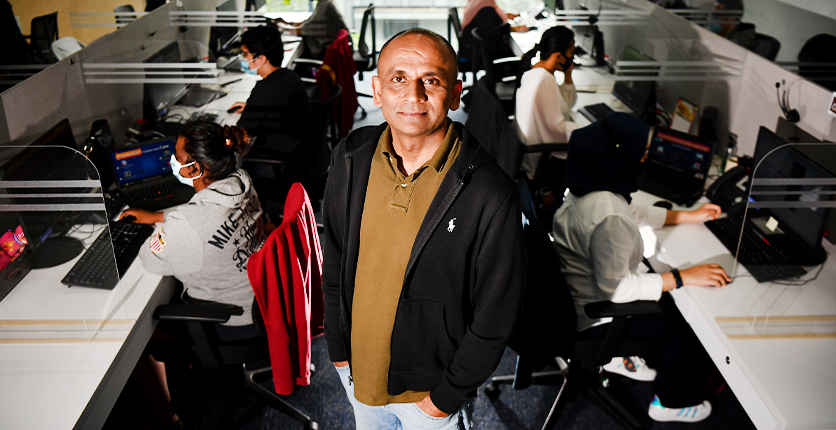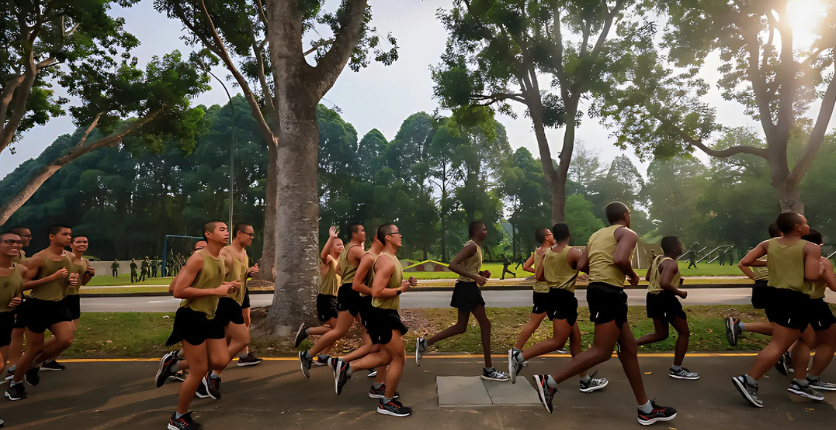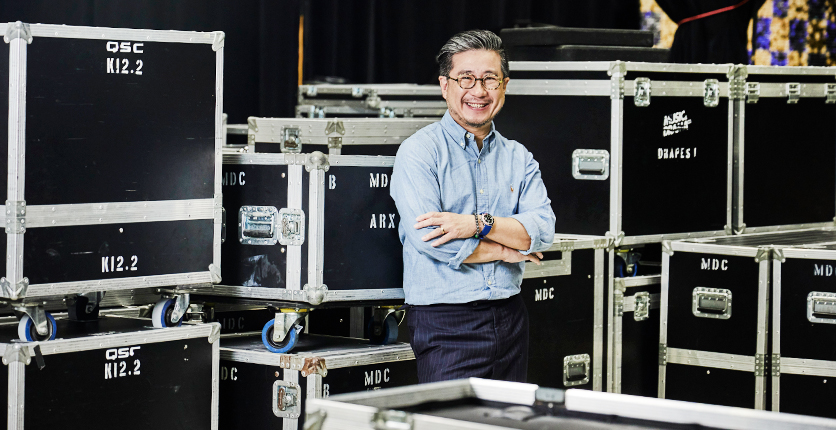The recipient of the President’s Volunteerism and Philanthropy Award in 2020, Anil David exemplifies how people should not be defined by their past mistakes.
David, who had gone to prison thrice, today runs the successful social enterprise Agape Connecting People, a business idea born from his time in prison when he had the opportunity to work in a call centre operated by fellow inmates.
Since its inception in 2012, Agape Connecting People has served as a beacon of hope by offering employment and a second chance to ex-offenders like David. It also hires people with disabilities and those from marginalised backgrounds.
In this interview with NSman, David talks about the pitfalls of taking shortcuts in life and how his NS experience helped him become the entrepreneur he is today.
Q: Can you tell us what Agape Connecting People is about?
Anil: The company has three business functions – we are a call centre, a provider of Singapore Workforce Skills Qualifications courses, and a licensed employment agency.
We handle outbound and inbound calls for a variety of clients that range from government agencies to MNCs to SMEs. We currently employ 150 people, many of whom are inmates, ex-offenders, disabled individuals and people from marginalised backgrounds.
For example, hospitals would outsource their call centre functions to us and we help patients make appointments as well as do product promotion. We also handle calls to the National Care Hotline. We act as a triage and help support more than 300 psychologists by handling calls from people who need help.

Q: What kind of calls did you handle during your time in prison?
Anil: I handled mostly outbound calls in which I would try to sell the person on the other line Starhub products and services. It was tough. Out of every 10 calls, I would get rejected eight times.
But this was a good thing because it taught me to be resilient and to accept failure. It was through all these failures that I learned to be persistent in life. I came to realise that if you keep knocking at the door, someone will eventually open it. Because of this experience, my command of English and communication skills also improved.
Q: Can you share one memorable call that you personally handled?
Anil: Apart from cold calls, I also handled some customer service-related ones. I still remember speaking to a Pastamania customer who was calling because the order was wrong and an hour late. You can imagine how furious this person was.
To handle such calls, I realised that the best thing to do is show empathy, listen and help solve the problem. This was particularly poignant to me – I went into prison because I did not listen to my loved ones. But having to talk to customers on the phone taught me how to listen to their needs and help them solve their problems.
Q: Why have you made it a point to hire ex-offenders and people with disabilities?
Anil: During my time in prison, I learned that many of the inmates are very creative and street smart people. Unfortunately, they had used these skills for the wrong reasons in life. Now that I run my own business, I want to give these people a chance to make it in life by helping them hone these skills for the right reasons.
I truly believe that these ex-offenders want to redeem themselves through meaningful employment. It is through employment that we have dignity. And it is through dignity that we can have purpose in life.
I also feel that people with disabilities need to be given more opportunities in life. In these individuals, I see the desire to be “normal” and accepted. They are the most committed employees I have. They are never late for work. They also complain the least!
Q: Can you name the biggest lesson your time in prison has taught you?
Anil: Life is all about making choices. You either make the choice to be motivated by something good, or by something bad. Being in a good environment will help you get motivated to do the right things. Being in a toxic environment will only destroy you. You have to define your own future and destiny. There are no bad people in prison – there are only people who made wrong choices.
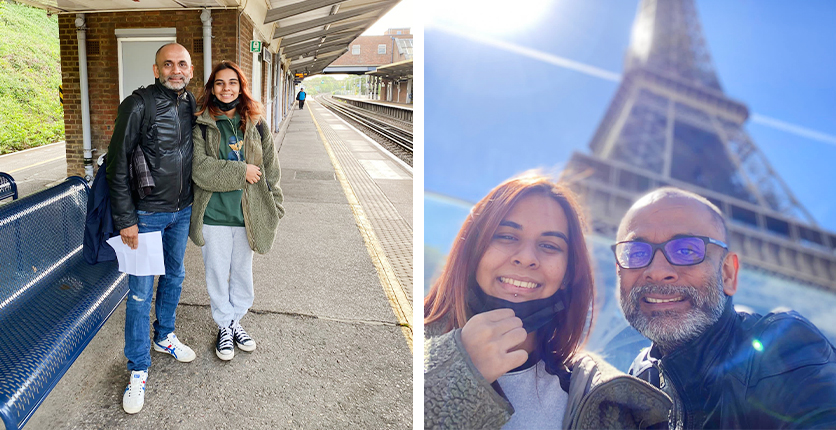
Q: You mentioned before that your previous transgressions were driven by the temptation to take shortcuts to success – how did you eventually kick this habit?
Anil: It was the love for my daughters. I told myself that I had to redeem myself as a father by not taking shortcuts anymore and by securing meaningful employment.
Q: Do you think society’s perception of ex-offenders is changing for the better?
Anil: Definitely. There has been a paradigm shift in terms of the way ex-offenders are being viewed. Companies today have really embraced such individuals. I think this is because society has become much more empathetic. The campaigns by the government, such as the Yellow Ribbon project, to change perceptions of ex-offenders have also been pivotal to this shift. These campaigns have told stories and raised awareness of issues in a manner that is very respectful.
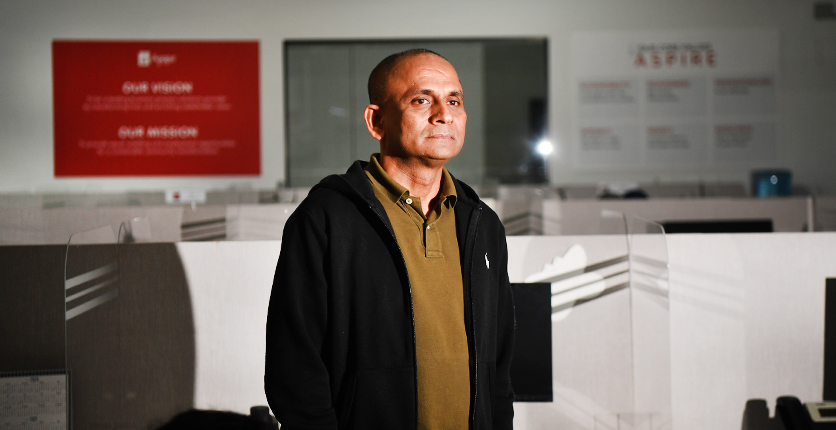
Q: You used to be a full-time soldier in a commando battalion from 1987 to 1991. Do you think your experience in the SAF has helped with the running of your business?
Anil: It has. The one thing the commandos and my business have in common is the need for endurance and discipline. I believe these qualities help you to succeed and achieve your goals.
I must also point out that, five years ago, I got reacquainted with my Officer Commanding from the commando battalion, and he has been an unwavering pillar of support and strength for me. He is always encouraging me and reminding me of the importance of being resilient. In fact, when I was setting up call centre operations in the women’s prison, he was right there beside me, helping train the ladies.
Q: What advice do you have for people who, like the former you, are eager to attain the status symbols in life?
Anil: Don’t focus on material wealth. The most precious thing in life is not a big house or a fast car. It’s family. The love you get from family, the meals you have with your loved ones – these are things that one cannot quantify and put a dollar value on.
Also, we must be patient in life and strive to achieve what we want through hard work. Taking a shortcut in life may produce short-term gains, but it will always be a painful route. Your actions will always come back to haunt you.
This story is a salute to NSmen like Anil, who have made an impact on society and in the lives of others. In appreciation of our NSmen as we commemorate 55 Years of National Service (NS55), servicemen can enjoy over 180 exclusive NS55 deals. More info on the deals here: www.safra.sg/
Want more personality articles like this, and other lifestyle content right in your inbox? Sign up for the eNSman Newsletter – you don’t need to be a SAFRA member to subscribe – and never miss another story!
Photos: SPH Media Trust, Anil David
